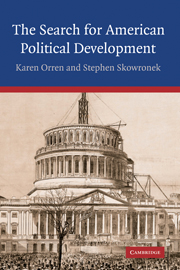1 - The Historical Construction of Politics
Published online by Cambridge University Press: 24 May 2010
Summary
The circumstances which accompany the birth of nations and contribute to their development affect the whole term of their being.
Alexis de TocquevilleThe study of american political development is a substantive inquiry guided by a theoretical precept. The substantive inquiry covers the full range of politics in the United States: past politics and present politics, political action and political behavior, political thought and political culture, movement politics and institutional politics. The theoretical precept is this: because a polity in all its different parts is constructed historically, over time, the nature and prospects of any single part will be best understood within the long course of political formation. Studying politics through history is nothing new; adherents to a developmental approach spurred the formation of political science as an academic discipline at the end of the nineteenth century. However, after several decades during which history was relegated to a decidedly minor role in the study of American politics, interest in historical approaches is resurgent. Recent years have seen the rise of a veritable cottage industry of political scientists engaged in historical investigations of one kind or another, and for the first time, we hear American political development referred to as “APD,” a subfield with its own name and acronym.
Why this new attraction to Clio? One explanation is that political scientists stepped into a void left when younger academic historians who specialized in the United States turned away from the study of government and leadership to concentrate on other things.
- Type
- Chapter
- Information
- The Search for American Political Development , pp. 1 - 32Publisher: Cambridge University PressPrint publication year: 2004



